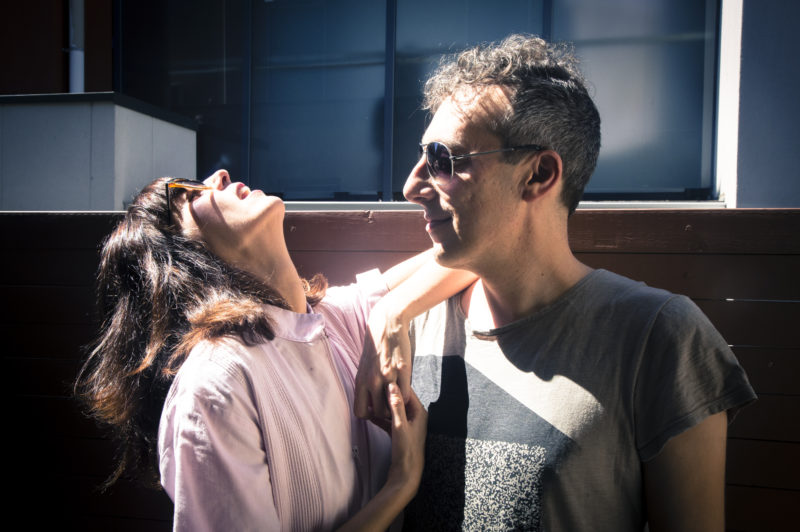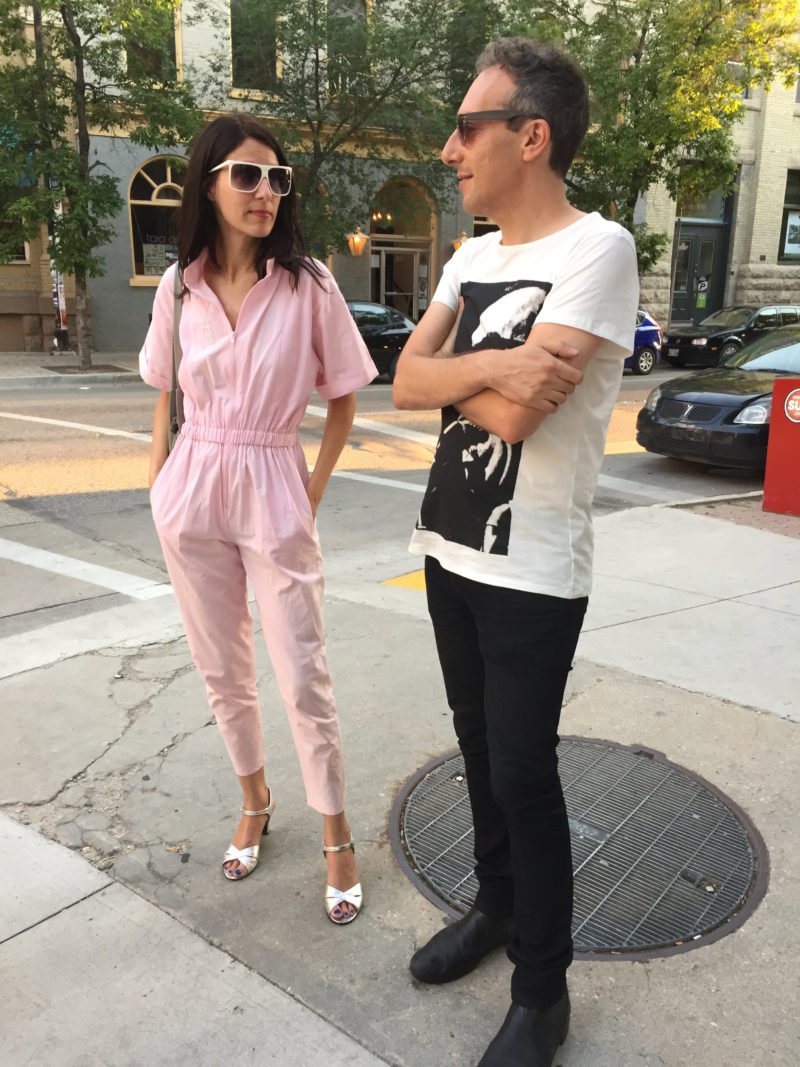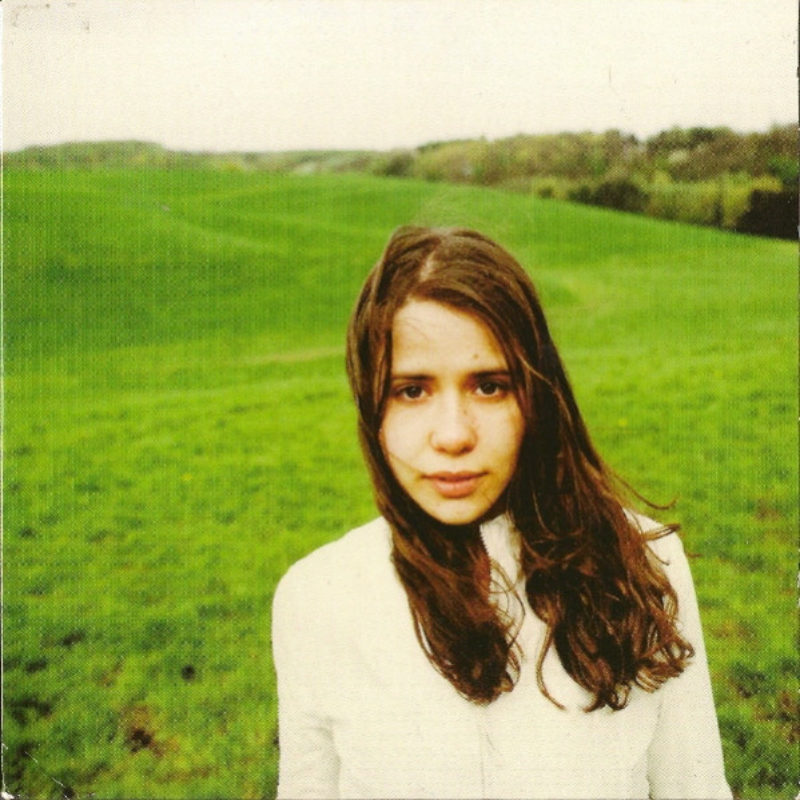Crys Cole & Oren Ambarchi

Niels Latomme
To start: I wondered what sound enters around 3:30 in the Pad Phet Gob piece, the last side of the Hotel Record? It sounds like a cow.
Oren Ambarchi
(Laughs) A what, a cow?
Crys Cole
It’s actually frogs in Thailand. They sounded amazing. It’s also why the piece is titled Pad Phet Gob (a very spicy thai frog dish).
NL
I start with that question because your music works draws upon the tension between the private and the public. I suppose you were very conscious of the fact that people will perceive the intimate sounds and words as ‘true’, because you present it as a couple — with a supposed honesty; but I was wondering if it’s a construct of ‘truth’ rather then the truth itself — for example, the frog sounds like a cow?
CC
The pieces on the album are compositions, so there are always details that are constructed and orchestrated, but the personal aspects of the record are captured through the day to day of our experience as a couple. We don’t fabricate situations or material in order to create a new ‘truth’ but rather, we make music that weaves our reality and personal lives into it. On Hotel Record, there’s a section where we are reading love letters to each other that we emailed each other years before. With elements like that, we want to bring in something that is intimate and personal, but we also wanted to obscure it so that the listener has a kind of voyeuristic experience of our relationship, but he or she isn’t really getting the full details.
OA
I agree that it’s completely natural. We’re not really making records for anyone other than ourselves. We do what feels right to us. For example, in the track that crys just mentioned, when we use words or dialogue there is a necessity for us to make it personal. It just feels natural for us to do that.
CC
Yeah, it has to relate to our relationship, the records are like diaries of our life together. I like the idea of documenting our lives through various contexts and places, and then moulding the material into something complete that we’re really happy with artistically. Throughout this process we are constantly pushing ourselves creatively.
OA
I think we both like challenging one another to do things that are a little uncomfortable. That’s exciting, because we’re in it together.
NL
There is an interesting quote that relates to the personal narrative and its role in the field recording genre:
If it’s true that successful field recording albums require a narrative, and that narratives arise ineluctably from interactions between people, then the narrative that Cole and Ambarchi are creating by addressing their listening to us illustrates this principle in action.
How do you feel about this?
OA
I’m always inclined to use whatever is necessary to make a piece work. If there is an instrument, or something around that is going to make the pieces in the puzzle fit, I’ll grab it and use it. a field recording can be a tool like that, but for us, with this collaboration – as crys said, it’s very diaristic – all of the recordings completely relate to our relationship. The Thai recording on the fourth side of the record was made on a romantic holiday. We were walking through a field and heard the frogs…
CC
… and every night we would go and record them.
OA
It’s intrinsically related to our lives, the field recordings we use on our records come from our experiences and travels together as a couple. It’s not just an effect that we are using.
CC
Field recordings usually have a very personal reference to me. It’s never arbitrary, but of course it’s also about the sound. It’s about creating a certain atmosphere, a certain space, and whether or not the recordings pick up on the personal narrative can be irrelevant in a way. We may know the relevance of a field recordings but it is not essential for the listener to pick up on the context.
OA
It can be experienced on different levels – as a sound environment or composition that is engaging to listen to, or on another level where there is a personal narrative.
CC
For example, side B of Hotel Record has a multitude of recordings that we made in our personal space, but it is a constructed composition. Nothing is random; but all of it is personal and recorded in our apartment — In the bathroom, in our kitchen while we’re making breakfast, things like that; except for the last element, which was done in a studio. It is really all coming from our lives and reality, and it has this domestic quality.
NL
Do you use music to shape your life – as a tool to understand it –, or the other way, does life shape your music?
OA
It’s kind of both.
CC
It’s so integrated into our lives. We both work on many other projects where our minds are more occupied directly with working on a particular project, composition, or collaborating with someone in a fixed period of time, whereas our duo develops more organically. And because it’s like a diary or a photo album, we can look back and reflect on things that happened in our lives the past few years. I love that aspect of it.
OA
It’s almost like a banal everyday thing that we do that gets transformed into something else. The next record will be recordings of us eating Dorito’s and watching Law & Order.
CC
(Laughs)
NL
How does it translate to a live context, which is completely different than your home, or the studio?
CC
Some of the pieces developed out of live performances. It started with a few experiments that we would do live, and we expanded upon them when we worked on the record. The first piece on the record grew out of a live organ, guitar and voice performance, and we had the opportunity to expand on it by running it through the Buchla synthesizer at EMS in Stockholm. It’s really kind of organic thing, because we have been doing these pieces for a couple of years. Some of the pieces morphed from live pieces into the pieces of the record and from there we continue to expand upon them in a live setting. Live we pull from the recent record, but also from the first record (Sonja Henies vei 31), and we’re always exploring new ideas and new territory.
OA
Our live performance is totally related to the records. But it always changes; it’s never the same thing.
CC
We have certain variables to make sure it’s impossible to be the same.
NL
Can you give an example?
OA
There are a lot of elements that can go wrong or fail. We’re using technology or elements that are unpredictable and that never react the same way in different spaces.
CC
Even beyond that, we have an element in the performance where we are actually playing a game. That game dictates how a part of the performance will shift, the timing, the dynamics and when different elements come in and out. It’s all based on who wins the game. (Laughs) That has led to many different variations in the performance. It’s a fun aspect of what we do.
NL
Who can’t cope with losing?
(Both laugh)
CC
Well… it’s quite insightful to our relation because we’re both extremely stubborn, and we’re both convinced that we’re right. So to me it feels, adding this competitive component to our performances is also quite reflective of our relationship.
OA
(Laughs)
CC
We’ve gotten pretty good at handling who loses during the performance.
NL
How does it work making a record, while you both are traveling so much?
OA
The recent record is a reflection of our life style, because we were not really in one place for really long. The first record is different because we weren’t able to be together for very long. It’s almost a brief snap shot of when we had the opportunity to be together – in those days sometimes we were separated for up to 6 months.
The new record is a second phase where we were always in a different place, trying to be together. As in, ‘Hi, I’ve got a gig in this city, can you come and after the gig we’ll stay for a while?’.
CC
Nowadays we are travelling 90 per cent of time together. So in a sense we are living together – where we live is the question mark. We are always migrating from place to place, to different homes. This impacts our work a lot, because so many different scenarios and circumstances stimulate us. Home is wherever we are in the world when we are together.

NL
Could you call the records you’ve made your home?
CC
That’s a nice way of looking at it.
OA
I like to think that records can be your home.
CC
They do ground you in a weird sort of a way.
OA
We could probably build a house from all of the records we own…
NL
Thanks for the interview!
